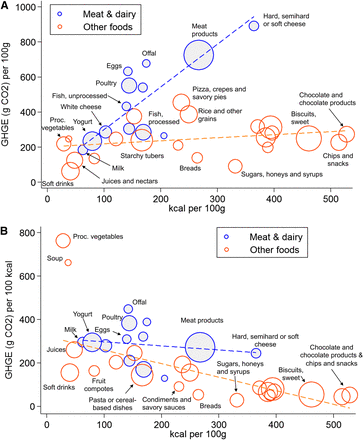Are frozen and processed fruits and veggies actually the worse than meat as climate offenders?
I just came across a fascinating study that challenges what I thought I knew. I& #39;m wondering why my fellow food/climate twitter peeps think (a thread)
I just came across a fascinating study that challenges what I thought I knew. I& #39;m wondering why my fellow food/climate twitter peeps think (a thread)
Here& #39;s the study. It looks at the GHG emissions of 34 food categories, and it does it not just by weight but by caloric density and nutrient density. https://academic.oup.com/ajcn/article/101/1/184/4564263">https://academic.oup.com/ajcn/arti...
We no doubt have to take the industry-created GHG database with a grain of salt, it still confirms what my gut has told me should be the case, even if the magnitudes are a bit off.
That is, that processing, packaging, refrigeration and freezing, and transport MATTER (3/n)
That is, that processing, packaging, refrigeration and freezing, and transport MATTER (3/n)
From a strictly caloric perspective, processed fruits and vegetables seem irredeemable when it comes to GHGs. Here& #39;s a different chart on the same data. Look at transport for processed fruits and veggies in the lower chart! (4/n)
In the past, I& #39;ve argued that moving to frozen from fresh fruit and veg, especially out of season, could help curb food waste. But this makes me second guess that argument.
Instead, it suggests that fresh, unpackaged, LOCAL veg is the best option when it comes to GHGs (5/n)
Instead, it suggests that fresh, unpackaged, LOCAL veg is the best option when it comes to GHGs (5/n)
NOTE: fresh produce data are not covered by their dataset. One would have to account for the GHG emissions of wasted fresh produce as well, but even if you doubled the blue section of the bar in the chart above, I can& #39;t imagine the emissions woldn& #39;t be significantly lower. (6/n)
Now, the nutrient density of processed fruit/veg is nearly off the charts (in a good way), so there& #39;s a clear tradeoff to be considered here. But given the costs and benefits of other foods, I think its clear that they should not dominate our diets. (7/n)
Soups are also a really interesting data-point. Generally low calorie, fair-to-moderate nutrient density, but high GHG.
Fish, dairy, and eggs, however, are all lower GHG and higher in nutrient density.
From a caloric density, grains seem like moderate options (8/n)
From a caloric density, grains seem like moderate options (8/n)
And the lowest emitters from a strictly caloric perspective???? Junk foods, chips, chocolate, biscuits, and sugars! (9/n)
Upshot? Barring feedback from other experts, it seems that unless you& #39;re eating local and fresh, or just eating nutrient poor foods, vegan diets may be extremely problematic from a GHG perspective.
As always, it seems a mix of diversity and moderation matters here. (10/10)
As always, it seems a mix of diversity and moderation matters here. (10/10)

 Read on Twitter
Read on Twitter




